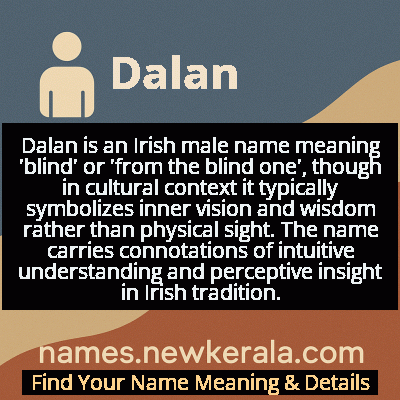Dalan Name Meaning & Details
Origin, Popularity, Numerology Analysis & Name Meaning of Dalan
Discover the origin, meaning, and cultural significance of the name DALAN. Delve into its historical roots and explore the lasting impact it has had on communities and traditions.
Name
Dalan
Gender
Male
Origin
Irish
Lucky Number
5
Meaning of the Name - Dalan
Dalan is an Irish male name meaning 'blind' or 'from the blind one', though in cultural context it typically symbolizes inner vision and wisdom rather than physical sight. The name carries connotations of intuitive understanding and perceptive insight in Irish tradition.
Dalan - Complete Numerology Analysis
Your Numerology Number
Based on Pythagorean Numerology System
Ruling Planet
Mercury
Positive Nature
Adventurous, dynamic, curious, and social.
Negative Traits
Restless, impatient, inconsistent, prone to indulgence.
Lucky Colours
Green, white.
Lucky Days
Wednesday.
Lucky Stones
Emerald.
Harmony Numbers
1, 3, 9.
Best Suited Professions
Sales, marketing, travel, entertainment.
What People Like About You
Versatility, charisma, adventurous spirit.
Famous People Named Dalan
Dalan O'Brien
Irish poet and scholar
Preserved traditional Irish poetry and folklore during the Gaelic Revival movement
Dalan McCormack
Musician and composer
Modern interpreter of traditional Irish music, blending Celtic sounds with contemporary arrangements
Dalan O'Connell
Historical figure
Community leader in County Kerry known for mediating disputes and preserving local traditions
Dalan Walsh
Athlete
Gaelic football player known for his strategic play and leadership on the field
Name Variations & International Equivalents
Click on blue names to explore their detailed meanings. Gray names with will be available soon.
Cultural & Historical Significance
The name's persistence through centuries of Irish history demonstrates its cultural resonance and the value placed on intuitive understanding in Gaelic society. During the period of English colonization, names like Dalan became symbols of cultural resistance, as Irish families maintained traditional naming practices to preserve their heritage. In modern times, the name continues to represent a connection to Irish identity and the rich tradition of Celtic wisdom, serving as a bridge between ancient cultural values and contemporary Irish identity.
Extended Personality Analysis
Individuals named Dalan are often characterized by their keen intuition and perceptive nature. Despite the name's literal meaning of 'blind', they typically possess remarkable insight into people and situations, demonstrating an almost prophetic understanding of underlying truths. This intuitive ability makes them excellent judges of character and natural counselors whom others frequently seek for advice. Their thoughtful, contemplative nature is balanced by a practical wisdom that allows them to navigate complex situations with grace and understanding.
Dalans tend to be deeply reflective individuals who value authenticity and truth above superficial appearances. They often exhibit strong analytical skills and the ability to see patterns and connections that others might miss. While they can be reserved in large groups, they form deep, meaningful relationships with those they trust. Their combination of emotional intelligence and practical problem-solving makes them effective leaders and reliable friends who approach challenges with both compassion and clear-eyed realism, embodying the Celtic ideal of wisdom that sees beyond the obvious.
Modern Usage & Popularity
In contemporary times, Dalan remains a distinctive but uncommon name, primarily used within Irish communities and by those with Celtic heritage. While not appearing on most popular baby name lists, it has maintained a steady presence, particularly in Ireland and among the Irish diaspora in North America and Australia. The name has seen a slight resurgence in recent years as part of the broader trend toward reviving traditional Celtic names. Modern parents often choose Dalan for its unique sound, cultural significance, and the positive connotations of wisdom and insight associated with the name. It appeals to those seeking a name that is both traditional and distinctive, offering a connection to Irish heritage without being overly common. The name's usage remains most concentrated in regions with strong Irish cultural ties, though it occasionally appears in diverse contexts as Celtic names gain wider appreciation globally.
Symbolic & Spiritual Meanings
Symbolically, Dalan represents the concept of 'inner vision' or 'second sight' - the ability to perceive deeper truths beyond surface appearances. The name embodies the paradox of seeing more clearly by looking inward rather than relying solely on external observation. In Celtic symbolism, this connects to the tradition of blind seers and prophets who possessed extraordinary wisdom despite physical limitations. Dalan also symbolizes authenticity and truth-seeking, representing someone who values substance over superficiality. The name carries connotations of guidance and mentorship, suggesting a person who helps others find their way through intuitive understanding rather than rigid rules. Additionally, it represents cultural continuity and the preservation of traditional wisdom in modern contexts, bridging ancient Celtic values with contemporary life while emphasizing that true understanding comes from insight rather than mere observation.

